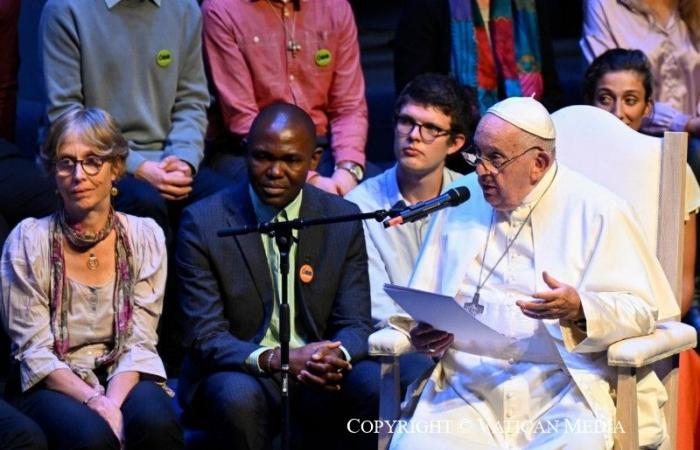
This article is a free article, not written by the editorial staff of Salon Beige. If you also wish to publish an open article, you can do so by clicking on “Submit an article” at the top of the page.
STORY – On Saturday afternoon, Francis’ visit to the University of Louvain in Belgium led this Catholic establishment to immediately issue a press release. There is deep disagreement over the role of women in the Church.
The pressure from Belgian Catholic universities on Pope Francis to change the place of women in the Church was relentless during his stay in Brussels. Provoked like never before by the demands of a “Christian ecofeminism”, Francis nevertheless resisted with the classic position of the “vocation” of women in the Church which his predecessor John Paul II, already harpooned, would not have denied. in the same place and on the same subject, during his visit in 1985. The first salvo was fired on Friday in the historic headquarters of this prestigious university, in Leuven, now Dutch-speaking. The second charge was launched on Saturday afternoon in Louvain-la-Neuve, the French-speaking seat of this renowned Catholic university which is celebrating its six hundredth anniversary this year, one of the reasons for Francis’ visit to Belgium. Until the provocation of an incident, hitherto unprecedented, in the series of pontifical trips.
Indeed, if the Pope had been long and warmly applauded with a standing ovation during this meeting with the professors and students of the University of Louvain, the passage in his speech on the question of women will have been deeply disappointing. To the point that as soon as he left the building, accompanied with thoughtfulness and a smile by Françoise Smets, rector of the Catholic university, an official press release from this establishment was distributed in the press gallery, where this rector expressed his “major divergence” with the Pope “regarding the place of women in society”.
“The Catholic University of Louvain, explained this press release – visibly prepared in advance since published 15 minutes after Francis’ intervention – expresses its incomprehension and disapproval as to the position expressed by Pope Francis concerning the place of women in the Church and in society. A deterministic and reductive position with which our university can only express its disagreement.”
The text added this profession of faith: “UCLouvain affirms itself as an inclusive university committed to against sexist and sexual violence”, it calls on the Church to fight against any “form of discrimination” which would be based on “the origins , gender, sexual orientations”. Valentine Hendrix, 22, a master’s student in international relations who was on stage with a group of students in front of the Pope, testified:
“We are extremely disappointed. We talked a lot in our message about the place of women but the Pope did not respond. The position of women is always inferior, the Pope leaves us aside, we are extremely shocked by what he said about the role of women in society. He speaks to us of a fertile, marital, maternity role, which is exactly everything we want to emancipate ourselves from and escape from. The Pope is still an extremely important figure in the world, we were hoping that he could move the discourse forward, which was not the case. »
“Change paradigm”
What exactly happened? In a long “letter”, read with passion to the Pope, in front of the entire faculty in the form of a spoken and musical story, collectively prepared over many months by around fifty students including this young girl, this direct question was was asked of Francis as part of a critical reading of his encyclical on integral ecology:
“Dear Pope Francis, the place of women, where can we find it in the Encyclical? Women are largely absent from Laudato if (…) do we not remain in an unfair distribution of tasks in the name of a so-called “natural” propensity which leads to a sexual division of labor? »
The students of Louvain deplore:
“Catholic theology has also tended to reinforce this division via its ‘theology of women’ which exalts their maternal role while prohibiting their access to ordained ministries.”
Hence this question from the students: “What place, then, for women in the Church? »
What place for women in the production of a framework of thought which innervates conceptions and decisions in the Church?
Students from the Belgian University of Louvain
First argument, the students regretted that
“the ideal of social justice which is promoted in this encyclical is not extended to gender justice: it ignores the fact that poverty is still predominantly female and that it is women who have suffered and still suffer the most cruelly the system of domination denounced several times in the text. »
They addressed this second criticism. The encyclical “Laudato si’” speaks of “the inclusion of all” but works to “invisibilize” women. Not only are they “invisibilized in their experiences but women have also been made invisible for their intellectual contributions”. Indeed “no female theologian is cited” by the pope in his encyclical while, the students retort,
“many of these intellectual women have studied and denounced the intrinsic links between domination of nature and domination of women, outlining inspiring ways to think about a Christian ecofeminism. »
Hence this new question: “What place for women in the production of a framework of thought which innervates conceptions and decisions in the Church? “. In particular to give access to “ecclesial ministries”? To get out of this impasse, the students of this Catholic university proposed to the Pope to “change the paradigm”. We must leave “the figure of a creative Father and sole master of the world” where “only masculine authority” would be valid, and abandon this “submission to a Father external to Creation” because “it does not correspond to a mature humanity and multiple”. Better to resort to “the treasures of spirituality” and the “development of various scientific disciplines. » In short, we must abandon “the moral position of overhang” which is a “second nature” among “many Christians” and “do justice to the multiplicity of spiritualities and epistemologies, to what Arturo Escobar calls the “pluriverse” , which is not an intellectual whim. »
“Rediscover the starting point”
The goal, the students conclude in their letter to the pope, is “to identify the roots of a centuries-old phenomenon in order to establish the foundations of a renewed justice that considers the different ways of making the world on a radical level. of equality. » With this last question: “Is the Church ready to take into account class, gender and racial inequalities? » to move towards “integral development”. But this “seems to us to be incompatible with the positions on homosexuality and with the place of women in the Catholic Church,” lamented the students who spoke on stage in front of Francis. In his response to this university theological debate that resembles a dialogue of the deaf, Pope Francis considered it necessary to “rediscover the starting point” with this question “who is woman and who is the Church?” » if only to escape “ideological prejudices”.
For Francis in fact “The Church is the people of God and not a multinational company” adding improvised “the Church is mother”. Therefore,
“Woman, among the people of God, is daughter, sister, mother. Like me, I am a son, a brother, a father. These are the relationships that express our being in the image of God, man and woman together and not separately! »
And the pope explains “women and men are people, not individuals; they are called from the “beginning” to love and to be loved. A vocation that is mission. Hence their role in society and in the Church.” As a result, he continued:
“What characterizes women, what is feminine, is not determined by consensus or ideologies. And dignity is guaranteed by an original law, not written on paper, but in the flesh. Dignity is an inestimable good, an original quality that no human law can give or take away. »
And it is “from this dignity, common and shared, that Christian culture develops in an ever renewed way, in different contexts, the vocation and mission of man and woman and their mutual being, in communion . Not against each other, in opposing claims, but for each other. » Improvising, he then observed “it would be feminism or masculinism, while the man is for the woman and the woman is for the man. » The pope’s last argument was of a spiritual nature: “Let us remember that women are at the heart of the salvific event. It is through Mary’s “yes” that God himself comes into the world. The woman is fertile welcome, care, vital devotion. » Adding out of his text “The woman is more important than the man”. He concluded on this point:
“Let us open our eyes to the many daily examples of love, from friendship to work, from study to social and ecclesial responsibility; from married life to motherhood, to virginity for the Kingdom of God and for service. You yourselves are here to grow as women and as men. You are on the move, in formation as people. »
Do you want freedom? Be seekers and witnesses of the truth! By trying to be credible and consistent through the simplest daily choices
Pope Francis
Francis ended his speech by addressing the question of truth:
“there is a greater reality that enlightens us and surpasses us: the truth. Without truth, life loses its meaning. Study has meaning when it seeks the truth, and in seeking it, it understands that we are made to find it, including by being critical. The truth can be found: it is welcoming, it is available, it is generous. »
Last advice from François:
“If we give up seeking the truth together, study becomes an instrument of power, of control over others. She does not serve, but dominates. On the contrary, the truth sets us free. Do you want freedom? Be seekers and witnesses of the truth! By trying to be credible and consistent through the simplest daily choices. Thus, this University becomes, every day, what it wants to be, that is to say a Catholic University! »
He even added this impromptu advice:
“Move forward, do not enter into the struggle and ideological dichotomies, the Church is woman. »
Post Views: 85





